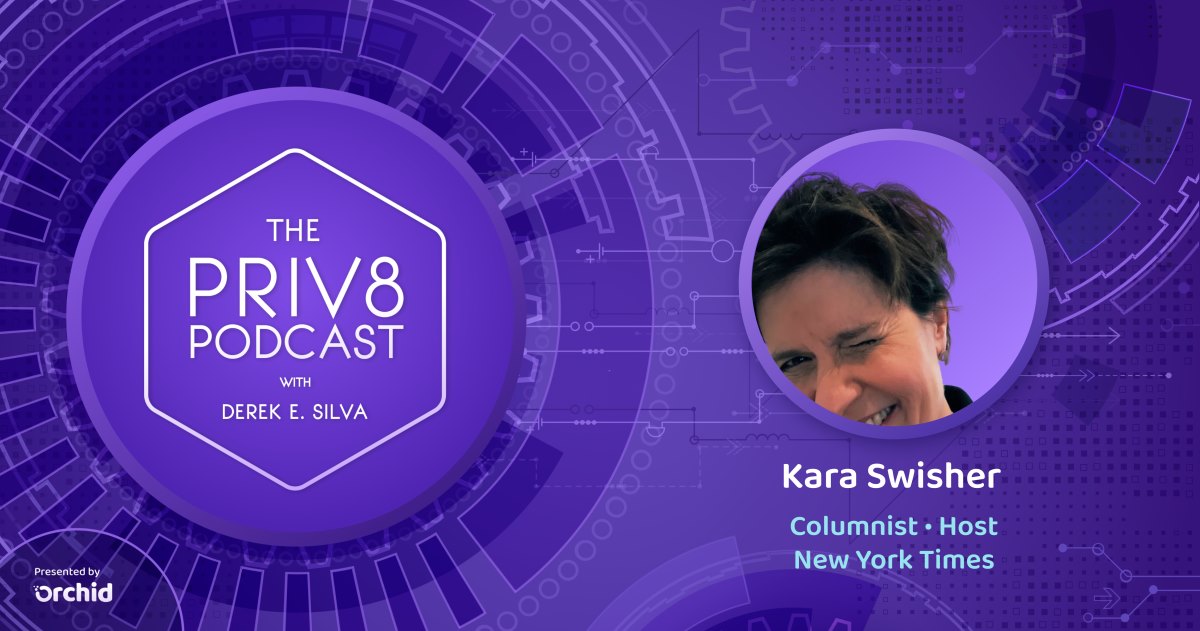
NYT’s Kara Swisher speaks with Audrey Tang on whether safety and privacy can co-exist
May 17, 2021
Kara Swisher has been described as Silicon Valley's "most powerful tech journalist." Her opinion pieces appear regularly in The New York Times, and she is the host and co-host, respectively, of podcasts Sway and Pivot. She sat down with Audrey Tang, a self-described "civic hacker" and the Digital Minister of Taiwan, at Orchid's Priv8 Digital Summit, a first-of-its-kind conference that focuses on digital privacy...
Audrey's revolutionary philosophy of bringing "radical" trust and transparency to government tech contributed to one of the most successful Covid-19 counter-responses in the world. Although Taiwan's population consists of nearly 24 million people, the island has experienced only 12 Covid-related deaths. Taiwan also has not instituted any widespread lockdowns throughout the course of the pandemic.
"Taiwan has really managed to excel at what's happening with the pandemic and what's happening in the response to it," Kara said. "Sometimes public health and privacy feel that they're at cross-purposes. ... What has worked, and what hasn't worked, especially around privacy and the protection of public health?"
What is "sousveillance"?
Audrey explained that the most important piece of Taiwan's counter-virus strategy was "participatory self-surveillance."
"The word 'surveillance' terrifies a lot of people in privacy, and in general; it's sort of a malevolent word," was Kara's initial reply.
So what is self-surveillance? Does it also have malevolent implications? Actually, no -- "There's this term called 'sousveillance,'" Audrey answered. The term was coined by Canadian engineer Steve Mann in 2002, Audrey explained. The term roughly translates to "undersight" -- effectively the inverse of surveillance, which means "oversight."
When Mann coined the term, he "talked about arming ordinary citizens with wearable cameras -- very fashionable," Audrey joked. Now, however, this has become a reality: "everybody has a phone, and could, for example, provide the information that's needed to keep public institutions accountable."
Sousveillance could, for instance, be "used to make sure that contract tracing still works" in a trustworthy, decentralized manner: "When people participate in it, they understand exactly what they are doing, and the incentives are aligned: they can keep each other healthy without revealing their identities to the wider community."
"This kind of self-surveillance enables the kind of public health measures that can go to places where traditional, top-down measures could not," Audrey said. In this way, self-surveillance and other participatory public health measures are "truly grassroots."
Governments must demonstrate radical trust and transparency toward their people
Kara noted that "if [governing] happens from the top down, and people are told what to do, they're more likely to resist it."
But what could "grassroots" governance look like on a practical level? In order for a "sousveillance"-based, decentralized Covid-tracking system to work, Audrey said that the government needs to "trust that participatory measures are going to be carried out by people who care about the health of themselves and their neighbors."
"People may not trust the government; perhaps it's better that way. But career public servants really need to trust their citizens," Audrey added. By offering trust and transparency to citizens first, governments can initiate the creation of the foundation that is needed for citizens to trust them.
Kara quoted a statement that Audrey made in an earlier conversation between the two: "The more trust you place in citizens, the more trustworthy they become; instead of asking people to come to technology, bring technology to where people are."

Combating the misinformation "infodemic" with "nerd immunity"
These decentralized, participatory systems can be created beyond the public health arena. For example, when it comes to widespread misinformation about Covid, or the "infodemic," as Audrey calls it. She explained that the proliferation of misinformation "is a symptom" of a larger problem: mistrust in public institutions.
Kara agreed that "Part of the mistrust [of government] has to do with polarization and misinformation."
"This creates a feeling that [personal] information is not being used correctly," which could result in redirection to news and information "that may seem more trustworthy" to the person receiving it -- even if it is not reflective of the truth, she explained. She pointed out that in the United States, "right now, the rumor around vaccines is that Bill Gates is putting a microchip in your vaccine, and that therefore, it's going to track you."
"I asked him; he said that this is not the case," Kara joked. Still, "there are generalized feelings about privacy and surveillance...that can turn very ugly and get in the way of vaccines, or mask-wearing, or other things like that."
How and why can misinformation proliferate in any society?
What has caused mistrust in the information that public institutions give to their citizens? Audrey explained that "The root cause is the [lack of a] participatory nature of getting the truth and figuring it out together -- in other words, journalism."
Therefore, the way to combat misinformation may be to invite more people into the information gathering and vetting process.
"If everyone thinks about how we can contribute to the common narrative of what's really happening," the spreaders of misinformation can be disarmed, Audrey continued.
"Sometimes people just don't believe [something], even if you give them deep proof," Kara countered.
"Surely," Audrey said. However, "Just like herd immunity, if we get enough people in a population to participate in just a little bit of fact-checking, just a little bit of news work -- it builds 'nerd immunity,'" Audrey said. That way, "Even if a certain individual believes a certain thing and shares it, it's less likely that people who have participated in fact-finding will re-share it."
You can listen to Kara and Audrey's full discussion of how to build government technology that preserves privacy here. And be sure to follow the Priv8 podcast on your favorite streaming service.
If you enjoyed this blog, subscribe here for privacy news, commentary, and product updates from Orchid.



